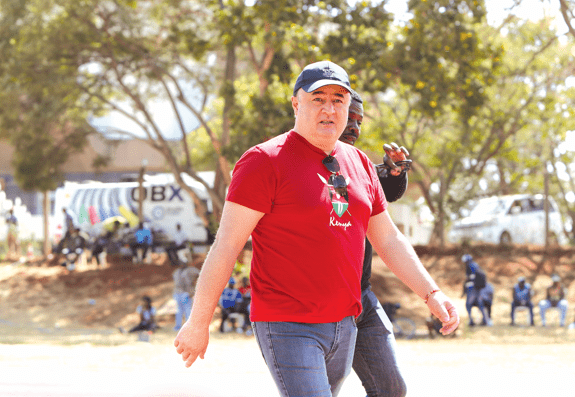A look at the Artiste & Repertoire side of music business

Artiste & Repertoire (A&R) is the blind spot job that literally makes artistes successful. The career choice is advancing in Kenya, proving highly essential to musicians of all calibre. Jackson Onyango gets down to find what this ‘behind the curtains’ type of work entails.
Being an A&R (Artiste & Repertoire) is one of the most confusing, misunderstood, and underrated job profiles in the music industry market.
Some lowball them to people that just discover talent and parade them for a fee, but that isn’t all to it.
One of Nairobi’s most decorated and aspiring music moguls, Arthur “Jinx” Oloo, describes the music industry as an “evolving one” and one that “keeps reinventing itself” and debunks the functions of an A&R in today’s world.
Jinx’ career in the music industry spans well over 10 years as radio presenter, programmer, and currently he holds the position of chief A&R in independent music label Quarry Boys Entertainment.
The self-employed music connoisseur has made this his bread and butter alongside other ventures.
“The role of A&R has changed as the music business has shifted from selling music physically to streaming.
Fundamentally, the A&R was hired by the label (music record company) to identify talent, the next sound, and to be ahead of the curve to determine where the music business is going,” he says.
The former Kiss 100 and Homeboyz honcho explains that with the power of the worldwide web and streaming, the influence of record companies has lessened with time effectively shaping their role into one of guiding an artiste and their rollout projects.
In a music industry such as Kenya’s, most artistes are independent, self-financed, but still have A&Rs they do not know are A&Rs.
As of 2020, according to Info Hub Kenya, there are over 120 registered record companies in Kenya.
Sandra Bartonjo, manager of a leading African live band Alternate Sound opines: “The best way to describe it is, I am the go-between in making an artiste achieve their creative goals, create awareness for their brand and all the while chasing opportunities to make them money for their craft.”
This again conflicts with job descriptions of marketers, public relations agents, managers or promoters, who are the ticket to creating press releases and confrences, and organise the most effective strategies to distribute the music to relevant media and outlets.
In essence, the A&R role is subjective, and is not as clear and explanatory as day and night.
However, there are striking similarities in all the perspectives we pursued, especially from the independent boutique practitioners, or the self-employed.
“In an ideal world, I’m to manage the development of the artiste’s creative content, develop marketing strategies, talent scout and be the link between them and captains of their craft for the development and creation of their brand and skill through collaborations.
This most of the time extends to an A&R becoming a therapist, booking agent, personal assistant and bodyguard; they become your instant relative,” Sandra expounds.
Covert duties
Of all available professions in the music business, the jobs that are more covert such as those pertaining to marketing, styling, accounting, or managing, are the roles that solidify an artiste’s brand and focus less on their creative aspect.
A&R practitioners fall into this category. They are low-key, yet still a very key part in an artiste’s brand and progression, and among one of the most sensitive departments in that.
However, the profession is evolving, and depending on who you ask, it’s being diversified and turned into a dynamic practice.
Of late, a lot of music executives— mostly donors with pocket change— are trying to capitalise on artistes’ talent, but in reality lack the passion or creative impetus for the arts, but find themselves joining the A&R bandwagons.
On the other hand, professionals from different fields such as Faiza Hersi, an Intellectual Property lawyer, uses her background in law to assist talents, and has actually developed a deep-lying affinity for A&R.
The multifaceted co-founder of Nairobi R&B, event organiser, advocate, and entrepreneur is leading the wave of propelling R&B artistes from Africa to the next level.
Her CV boasts of an international line-up from Tems Baby, Tay Iwar (both featured on new Wizkid album), Xenia Manasseh, Karun, and Xtatic.
“My initial source of inspiration was 100 per cent Tay Iwar. He played a major role in trusting and allowing me the freedom to A&R some songs for him. One of my very first (and favourite) songs made it on his next project,” she says.
In recent times, a few A&Rs such as Kitawi Mwakitele (proven from his works with Ethic Entertainment) and Mwalimu Rachel with Sailors, are among the most hailed.
The generation prior was largely steered by pioneers such as Buddha Blaze, Tim Rimbui and Tedd Josiah.
“Before the 80s and piracy in Kenyan music, proper music labels reigned. They would scout for talents and finance their ideas.
That’s when Kenyan artistes would sell one million records, go platinum and get promoted overseas; there was a real sense of professionalism and structure.
Today’s A&R faces numerous challenges,” legendary music mogul Tedd Josiah tells Spice.
A&R sounds simple and glamorous from the outside, but the work isn’t a cookie job, as Camille Storm, founder of C&C Distribution platform, explains.
As one of Nairobi’s premium and most-sought out A&Rs, the 24-year-old Apple Music curator is a music consultant, event organiser, music consultant, and music journalist.
Camille has an array of clientele under her Camille & Co creative boutique that ranges from Kwesta, Willy Paul, Yarden, Terri, Rema, Kahu$h and Mayorkun, amaong others.
“I’ve been putting in work since I was 20 years old to build an extensive network.
If I heard a cool, or interesting artiste or music industry professional, be it a DJ, producer, or manager, I would make a point to make myself known to them,” she says, while emphasising that networking value is the key to creating multiple business opportunities.
Blurred lines
Working with artistes can also be a full-time rollercoaster ride according to Sandra.
She says the lines are blurry when it comes to what A&Rs’ day-to-day activities entail. Artistes have mistaken them for personal assistants or even messengers.
“Most of the time, it’s a challenge to separate business and personal stuff because you become so close to the person and when it comes to time to make decisions you fight between whether it benefits the person or the brand,” says Sandra.
She adds, “I’ve had to go to the chemist at 3am to buy condoms for an artiste, and another time cops came to remove a girl from the artistes’ room because he invited her without informing me and she refused to leave the next morning. It was a mess.”
Basically, artistes’ personal demands and unorthodox lifestyle patterns always collide with their A&R’s job, whose main tasks should be projects’ supervision, managing resources, and assembling the same on certain budgets.
Music business specialist and former Sauti Sol publicist Anyiko Owoko suggests that in terms of funding projects and creating a company, one must be able to take certain things into consideration.
“I was warned early not to dig into life savings because that’s not how business works. You have to write all your cost to run the business; afterwards, you put that down and write a business plan.
Whatever you ask your client to pay you, it must cover all your costs,” she says, intimating that it’s not as easy as it sounds.
Jinx concludes that A&Rs are not authorities in artistes’ careers, but more like “helping hands” whereby they can arrange songs and putting together a rollout.
They do get a healthy check in non-disclosure agreements, a thing that made Jinx to leave a lucrative job at a mainstream radio station.









